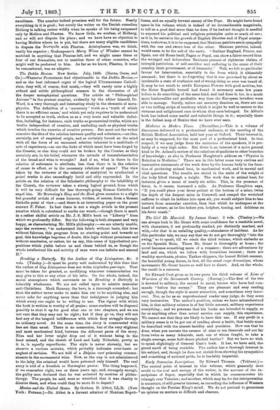The Dublin Review. New Series. July, 1869. (Burns, Oates, and
Co.)—Whatever Protestants find objectionable in the Dublin Review,— and as the best informed organ of the logical Ultramontane Catholi- cism, they will, of course, find much,—they will rarely miss a highly refined and subtle philosophical acumen in the discussion of all the deeper metaphysical questions. The article on "Philosophical Axioms" in the present number, evidently by the editor himself, Dr. Ward, is a very thorough and interesting study in the elements of meta- physics. The definition of a ' necessary ' truth as a truth of which there is no efficient cause,' and which yet only requires to be understood to be accepted as truth, strikes us as a very acute and valuable defini- tion, including, for instance, such truths as geometrical truths, which are truths independent of creation, and excluding such as physical truths which involve the exercise of creative powers. But must not the writer conceive the idea of the relation between quality and substance,—an idea, certainly, not of empirical origin, and as certainly forced on the mind with all the force of an uncaused relation inherent in a multitude of acts of experience,—as one the links of which must have been forged by the Creator, or else they could not be broken by the Creator, as they certainly are, in his belief, whenever the miracle of transubstantiation of the bread and wine is wrought ? And if so, what is there in the relation of substance to attribute, less than there is in the relation of Cause to effect, or in the necessary relations of space? The view taken by the reviewer of the relation of analytical to synthetical a priori truths is also exceedingly lucid and ably expounded. In the article on the relation of the Scholastic philosophy to the infallibity of the Church, the reviewer takes a strong logical ground, from which it will be very difficult for less thorough-going Roman Catholics to expel him. Mr Browning's Ring and the Book gives occasion to a slight but graceful article of some humour, written, of course, from a Roman Catholic point of view ;—and there is an interesting paper on the great convert F. Faber. In fact there is not a single article in the present number which is calculated to excite our wrath,—though there is much in a rather skilful article on Mr. J. S. Mill's book on "Liberty" from which we profoundly differ. But the following is both eloquent and very happy, as characterizing Mr. Mill's philosophy :—we are utterly unable, says the reviewer, "to understand this fabric without basis, this lever without fulcrum, this progress from no starting-point and towards no goal, this knowledge begotten of doubt, this logic without premisses and without conclusion, or rather, let us say, this ocean of hypothetical pro- positions which yields before us and closes behind us, as though the whole intellectual life and activity of man were one infinite and eternal If."






























 Previous page
Previous page